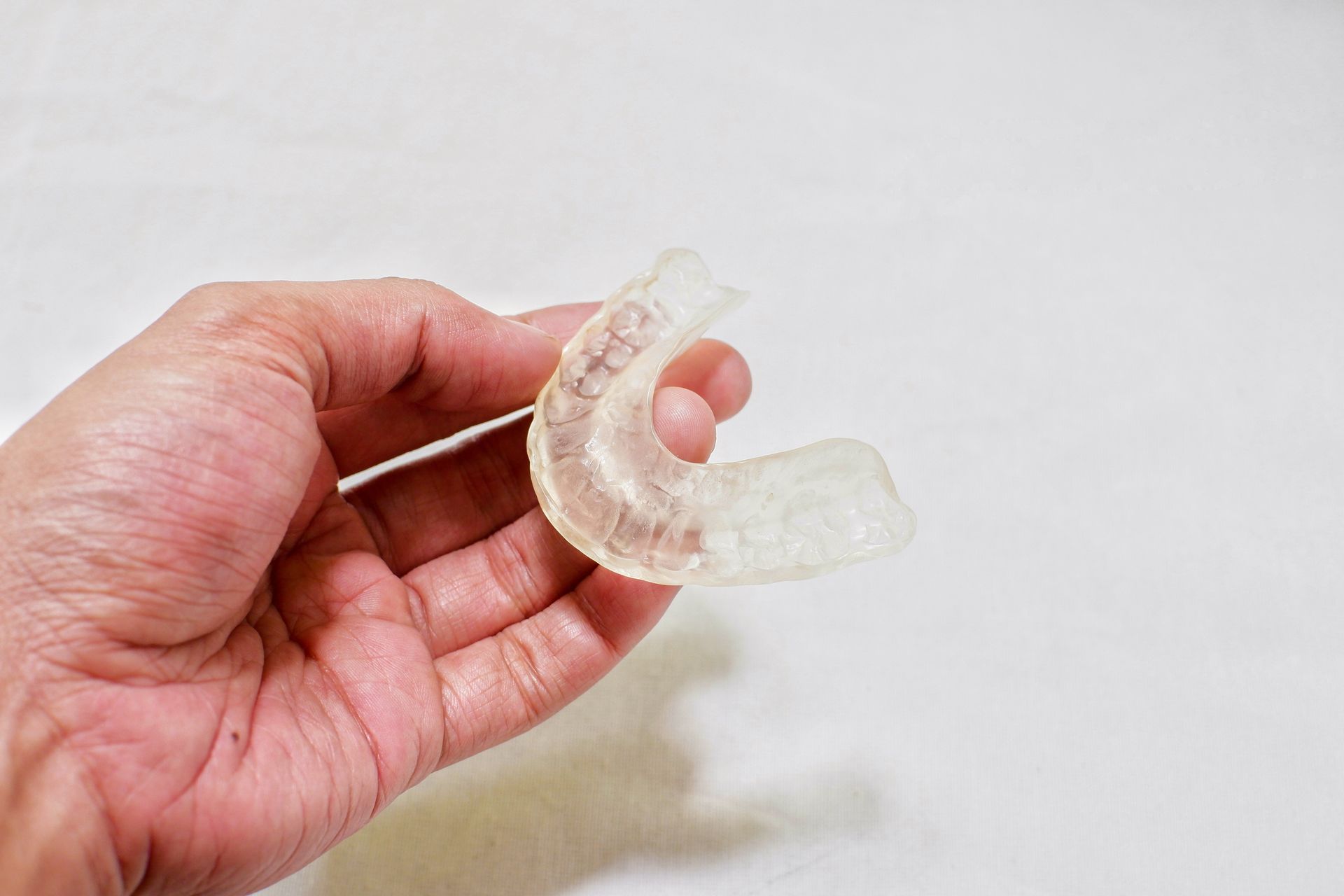Why You Should See a TMJ Specialist Instead of a Cosmetic Dentist for TMJ Treatment
Find Lasting Relief From TMJ Pain With Specialized Care

Temporomandibular joint (TMJ) disorders can cause ongoing jaw pain, headaches, ear pain, ear fullness, trouble chewing, and even ear or neck pain. When looking for treatment, many people may visit a cosmetic dentist. However, not all dentists have the comprehensive, in-depth training and expertise to properly diagnose and treat TMJ issues. Cosmetic dentists in particular may offer TMJ treatment, but often have more of a focus on improving alignment and jaw issues for aesthetic reasons rather than functional ones. From in-depth diagnostic testing to a comprehensive, multi-faceted approach to treatment, TMJ specialists are a better choice for lasting results from TMJ pain and better overall health.
At Restore TMJ & Sleep Therapy in The Woodlands, we know how challenging and even life-disrupting TMJ and facial pain can be. Because TMJ disorders are complex, they can often be difficult to diagnose. That’s why TMJ specialists Dr. Katherine Phillips and Dr. YC Joseph FischerHahm bring their extensive expertise to accurately identify and treat dysfunctions affecting the face, mouth, and jaw. With decades of experience, they have dedicated their practice to providing effective, long-term solutions for TMJ pain relief. Using a comprehensive approach that integrates a range of proven treatments, they help patients achieve lasting comfort and improved quality of life.
What Is a TMJ Specialist?
A
TMJ specialist is a dentist or medical professional with extra training in diagnosing and treating TMJ disorders. Unlike general or cosmetic dentists, TMJ specialists focus on how the jaw joint and muscles function. They go beyond just teeth or bite alignment to address the root causes of TMJ issues.
Key Qualifications of a TMJ Specialist
In addition to a Doctor of Dental Surgery (DDS) or Doctor of Dental Medicine Degree (DMD), a TMJ specialist will also have:
- Additional specialized training and education. TMJ specialists receive extra training on how the jaw works, how muscles affect movement, and ways to manage pain. They take advanced courses to better understand and treat TMJ disorders and typically must complete continuing education requirements on a regular basis..
- Advanced diagnostic tools. TMJ specialists use advanced tools to get a clear picture of jaw movement. These include CBCT scans (3D imaging) for detailed bone structure, TENS units (nerve stimulation) to relax muscles, and jaw tracking to analyze motion patterns.
- Comprehensive treatment plans. Instead of a one-size-fits-all approach, TMJ specialists can offer comprehensive custom treatment plans. These may include splint therapy, physical therapy, laser therapy, trigger point injections, special oral appliances, or even medical treatments like Botox to relieve pain.
- Additional certifications and professional memberships. A TMJ specialist should be certified in orofacial pain, oral medicine, or both, as well as membership in professional organizations like the American Academy of Orofacial Pain (AAOP) or the American Academy of Craniofacial Pain (AACP).
What Is a Cosmetic Dentist?
A cosmetic dentist is a dentist who specializes in improving the look of teeth and gums. They perform general dental work, but their main goal is to improve the appearance of a person’s smile. They focus on treatments that enhance aesthetics rather than addressing issues with the jaw or bite.
Key Qualifications of a Cosmetic Dentist
Cosmetic dentistry isn’t a formal specialty, but does require the DDS or DMD degree of a certified dental professional. In addition to general dentistry, a cosmetic dentist will also typically have:
- Training in aesthetics. Cosmetic dentists receive additional training in treatments such as veneers, teeth whitening, and smile makeovers. These procedures help improve the appearance of a patient's teeth and overall smile.
- A focus on appearance. The primary goal of a cosmetic dentist is to make teeth look better, rather than treating jaw pain or dysfunction.
- Experience with routine procedures.
Cosmetic dentists often provide treatments such as bonding, porcelain crowns, and gum reshaping to enhance smiles. Orthodontic procedures are also common to help straighten teeth and improve their appearance.
The Difference Between a TMJ Specialist and a Cosmetic Dentist
While cosmetic dentists may offer TMJ treatment, their primary expertise is in improving the appearance of teeth and correcting bite alignment for aesthetics rather than function. While this can sometimes help TMJ symptoms, it may not treat the root causes of TMJ disorders, such as joint and muscle dysfunction. A more complete approach is usually needed to address these issues for long-term relief.
TMJ specialists, on the other hand, focus specifically on diagnosing and treating the underlying joint and muscle issues that cause TMJ disorders, and have the deep experience and additional training necessary to do this safely and effectively.
Here are 3 key differences between TMJ specialists and cosmetic dentists.
1. Training and Education
- TMJ specialists receive extensive training in jaw function, muscle tension, and joint health.
- Cosmetic dentists primarily train in aesthetic dental procedures, such as veneers, crowns, and teeth whitening.
2. Treatment Philosophy
- TMJ specialists use a medical, functional approach to treat the underlying causes of TMJ disorders.
- Cosmetic dentists may rely on bite adjustments, crowns, or aligners, which can improve appearance but often cannot resolve underlying TMJ issues.
3. Tools Used for Diagnosis and Treatment
- TMJ specialists often use advanced diagnostic technology such as jaw tracking, muscle scans, and 3D imaging, to create individualized treatment plans.
- Cosmetic dentists evaluate bite patterns and may offer bite splints or night guards. However, they often do not perform more than basic joint and muscle evaluations.
3 Common Myths About TMJ Treatment from a Cosmetic Dentist
Many people assume any dentist can treat TMJ disorders, but this isn’t always the case. Here are a few common myths surrounding TMJ treatments:
Myth #1: Cosmetic dental work can fix TMJ disorders.
Some cosmetic dentists will adjust the patient's bite with crowns, veneers, or orthodontics to fix TMJ issues. While this might help in some mild cases, it often doesn’t address the real underlying problem. TMJ disorders go beyond just bite alignment — issues like joint inflammation, muscle tension, and nerve involvement need specialized care for lasting relief.
Myth #2: A generic night guard, or over-the-counter night guard is enough to relieve symptoms.
Cosmetic dentists may recommend a basic night guard or store-bought night guard to help with teeth grinding. While these might offer some protection, they don’t do much to fix jaw alignment or relieve muscle tension. A TMJ specialist, however, can provide a custom-fit appliance that is designed to support the jaw and ease discomfort.
Myth #3: TMJ pain is just a dental problem.
A TMJ disorder doesn’t just cause jaw pain — it can affect your whole body, from your neck to your posture. A TMJ specialist looks at more than just your teeth. They focus on your overall muscle balance, the nervous system, and how your jaw moves so they can find the true cause of your pain. A cosmetic dentist, on the other hand, focuses on making your bite look good, but they may not always consider the full range of concerns handled by a TMJ specialist.
Why a TMJ Specialist Provides More Effective, Long-Term Relief for TMJ Disorders
If you are struggling with TMJ pain, a TMJ specialist will have the time, experience, resources, and diagnostic technology to gain a more complete understanding of your symptoms and figure out what’s really causing the issue. After a comprehensive evaluation, they can then develop, direct, and monitor a treatment plan that’s built just for you, even if that means referring you to other medical specialties.
Here’s what makes a TMJ specialist’s approach to treating TMJ pain more effective than that of a cosmetic dentist:
Comprehensive Diagnosis
A TMJ specialist takes a holistic approach to patient assessment, considering factors such as:
- Jaw alignment and joint function
- Muscle imbalances and tension
- Lifestyle factors like stress and posture
Custom Treatment Plans
Rather than applying a standardized, one-size-fits-all method, TMJ specialists provide customized treatment plans tailored to individual patient needs.
- Medical-grade oral appliances that support proper jaw positioning through splint therapy.
- Physical therapy and muscle relaxation techniques
- Non-invasive treatments like Botox, trigger point injections, or laser treatment to relieve muscle tension
Multi-Disciplinary Approach
Many TMJ specialists collaborate and consult with a diverse range of other specialists, including:
- Chiropractors to improve posture and reduce tension
- Physical therapists for jaw exercises and mobility improvements
- Pain management experts to address chronic discomfort
Focus on Pain Relief and Function
Cosmetic dentists focus on making your smile look better, while TMJ specialists work to improve jaw function and comfort. TMJ specialists diagnose the causes of jaw pain and create treatment plans to help restore normal movement. Their goal is to reduce pain, improve function, and prevent future joint problems.
When to Choose a TMJ Specialist Over a Cosmetic Dentist for TMJ pain
If you’re unsure whether you need a specialist, consider these signs of a TMJ disorder:
- Chronic orofacial or jaw pain, clicking, or popping
- Frequent headaches or migraines
- Difficulty chewing or locking of the jaw
- Neck, shoulder, ear pain, or ear fullness.
- No relief from a generic night guard or bite adjustment
Long-term relief from these symptoms is possible with treatment from a TMJ specialist like Dr. Katherine Phillips or Dr. YC Joseph FischerHahm of Restore TMJ & Sleep Therapy in The Woodlands. They can provide more than just surface-level fixes; they can pinpoint and treat the root problems causing your jaw pain and dysfunction so you can enjoy a better quality of life.
Trust Your Health to the TMJ Specialists at Restore TMJ & Sleep Therapy
Effectively addressing TMJ disorders requires more than just managing pain and symptoms—it demands a comprehensive approach that corrects the underlying physiological issues. At Restore TMJ & Sleep Therapy, we recognize that every patient is unique, which is why there is no one-size-fits-all solution for TMJ treatment. Instead, the most effective care often involves a combination of therapies, such as:
- Splint therapy
- Botox injections
- Medications
- Laser therapy
- Physical therapy
- Self-care and lifestyle modifications
- Trigger point injections
The specialists at Restore TMJ & Sleep Therapy consistently remain at the forefront of innovative TMJ treatments while also being experts in proven approaches. Dr. Phillips and Dr. FischerHaham not only provide precise diagnoses and tailored treatment plans but also offer ongoing care, monitoring, and adjustments to ensure the best possible outcomes for your TMJ therapy.
When it comes to TMJ treatment, experience makes all the difference. Schedule a consultation with Restore TMJ & Sleep Therapy today to explore your options and take the first step toward lasting relief from TMJ pain.
-2700x842-1920w.png)
















